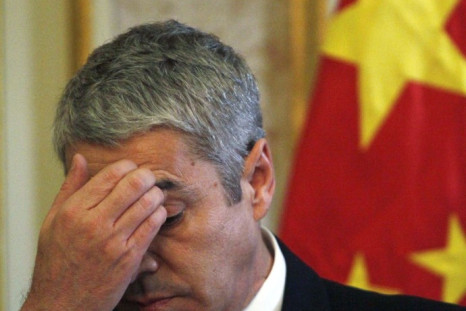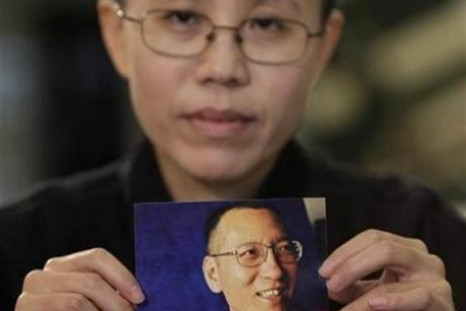Pakistan, Pervez Musharraf and the myth of the "good dictatorship"
This week the former President and military ruler of Pakistan, Pervez Musharraf, said he believed that "a good dictatorship is better than a bad democracy".
What's next for Commodity Prices?
We were expecting the parabolic move in commodity prices to be interrupted by a correction at some point. While it could not have been anticipated as the catalyst for a pullback, the catastrophe in Japan two weeks ago prompted a sizeable sell-off in risk assets, including commodities. The question is whether in the aftermath of this event, or other lingering concerns, commodities can restart a substantive move to higher levels.
Stanley Gibbons share price up on FTSE as FY profits rise
Shares in Stanley Gibbons were up on the FTSE AIM All Share in morning trading after the stamp and collectibles company reported a rise in sales and pre-tax profit in the full year ended 31 December 2010.
Premier Farnell FY profits rise, impact of Japan supply chain problems "not yet fully understood"
Shares in Premier Farnell were up on the FTSE 250 in morning trading after the distribution group reported a strong rise in revenue and pre-tax profit in the full year ended 30 January.
The opportunity for emerging market stocks is still some ways off
The prospects for emerging markets are very appealing on a secular basis. The performance in the equity markets from countries in Emerging Asia to Latin America has been impressive for the better part of the last decade. A torrid pace of economic activity, growing per capita incomes, improved fiscal conditions, and overall global growth have helped to foster an environment for investments in these markets to flourish.
Is the dollar’s role slipping?
During the height of the financial crisis, the U.S. dollar spiked as investors fled to the quality and safety of what is considered to be the world's reserve currency. Peaking in March 2009, the dollar has had but one strong rally since. That occurred in late spring 2010 as worries that the U.S. might experience a double-dip recession heightened. As equities were sold investors once again plowed into the valued destination of the dollar. In both instances the dollar's store of value be...
WPP profits jump, shares dip
Shares in WPP were down on the FTSE 100 in morning trading after the advertising group reported a rise in revenue and pre-tax profit in the full year ended 31 December 2010.
Diageo share price up on FTSE 100 after Turkish acquisition announced
Shares in Diageo were up on the FTSE 100 in morning trading after the beverage company said it would be acquiring Turkish spirits company Mey Icki for £1.3 billion.
China Syndrome
The central bank of China raised interest rates again last week and followed that by increasing the reserve requirement for the country's banks this week. This has been a fairly consistent pattern by the People's Bank of China over the last four months. The signs of creeping inflation and speculative activity in the property markets are clearly higher than the authorities' comfort level. Consequently, monetary policy is in the midst of "catching up" to economic activity.
The hibernating global bond bear is awakening
Central banks in the U.K., Europe, Australasia and Latin America, are focused on the ill effects of inflation, which is rising at a rate that threatens to impair economic growth in their respective jurisdictions. This follows a period where these economies were attempting to stoke growth through monetary stimuli that led to lower interest rates and sizeable gains in bond prices. This is now changing.
InterContinental Hotels share price down on FTSE 100 despite FY profit rise
Shares in InterContinental Hotels were down on the FTSE 100 in morning trading despite the group reporting a rise in revenue and operating profit in the full year ended 31 December 2010.
A warning for emerging market investors
To state that many of the world's fastest growing economies are found in the emerging market countries of Asia and Latin America is hardly a revelation at this juncture. Additionally, it is widely known that the performance of the equity markets throughout these continents has been exceptionally strong for years. In fact, the MSCI Emerging Market index has returned better than 13% (without dividends) on an annualized basis for the last decade, while the S&P 500 and MSCI EAFE indices - proxi...
AstraZeneca share price up on FTSE 100 as FY profit rises
Shares in AstraZeneca were up on the FTSE 100 in afternoon trading after the pharmaceutical giant reported a rise in pre-tax profit in its fourth quarter and full year results.
Associated British Foods share price down on FTSE 100 despite Christmas sales rise
Shares in Associated British Foods were down on the FTSE 100 in morning trading, despite the group reporting double digit sales growth in the 16 weeks to 8 January 2011.
Burberry share price up on FTSE 100 as Q3 sales rise 27%
Shares in Burberry were up on the FTSE 100 in morning trading after the luxury fashion retailer strong double digit profit growth in the third quarter ended 31 December.
Burberry share price up on FTSE 100 ahead of Q3 results
Shares in Burberry were up on the FTSE 100 in afternoon trading ahead of the luxury fashion retailer's third quarter results, due tomorrow.
Is default Portugal’s Manifest Destiny?
The daisy chain of events manifesting from the European fiscal crisis that initially consumed Greece then Ireland in its wake has skipped into Portugal. This is not being greeted by market participants as much of a surprise since this development had been foreshadowed for months. Portuguese bond yields had risen above 7%, roughly 4% higher than the benchmark 10-year German bund. This is the inglorious territory of Greek and Irish bond yields just as they were teetering on fiscal insolvency. ...
South Sudan is just one of Islam's "bloody borders"
Voters in the ongoing referendum in South Sudan on independence from the rest of the country have been given a very interesting choice on their ballot papers.
Robert Walters share price up on FTSE as Q4 profits rise 42%
Shares in Robert Walters were up on the FTSE All Share in morning trading after the recruitment firm reported strong profit growth in the fourth quarter ended 31 December.
Mothercare share price down on FTSE 250 as snow hits sales in Britain
Shares in Mothercare were down on the FTSE 250 in morning trading after the retailer reported a it had been impacted by the cold weather in the 12 weeks to 1 January 2011.
Lloyds Banking Group and RBS share price down on FTSE 100 as China moves in on Spain debt
Shares in British banks were mixed on the FTSE 100 in morning trading following indications that the global economy may be stabilising somewhat.
Lloyds Banking Group, RBS, Barclays and HSBC share price up on FTSE 100 after Chinese express support for euro
Shares in British banks were up on the FTSE 100 in morning trading following what appeared to be positive comments on the euro by the vice premier of China.
A good look at Liu Xiaobo
It's not often that an article in the Guardian interests me, but yesterday between the regular complaints about the cuts and the stories of the plight of downtrodden workers in far away places, there was a real gem of a piece about the Chinese dissident and now Nobel Peace Prize winner Liu Xiaobo.
Lloyds Banking Group, RBS, Barclays and HSBC share price up on FTSE 100 as euro doubts continue
Shares in British banks were up on the FTSE 100 in morning trading following an earlier dip brought about by continuing fears about the eurozone.
Tesco share price up on FTSE 100 as Q3 sales rise 8.8%
Shares in Tesco were up on the FTSE 100 in morning trading after the supermarket giant reported a rise in sales in its third quarter ended 27 November.
Kingfisher share price up on FTSE 100 as Q3 profit rises
Shares in Kingfisher were up on the FTSE 100 in morning trading after the group reported a rise in retail profits, despite a slight drop in sales in the third quarter ended 30 October 2010.
China post script - An issue of differing perspectives
Maybe David Cameron, Britain's Prime Minister, was considering the fate of Ai Weiwei's Shanghai Studio, when he gave his carefully worded speech on 10 November 2010 in front of a group of Beijing University students. Mr Ai, who designed the 2008 Beijing Olympic Stadium, had made documentaries about Chinese dissidents and human rights issues, which, it would appear, were not to the liking of the authorities. It turns out that his studio in Shanghai has not got proper planning permission a...
As long as China's regime continues, so will North Korea's tantrums
North Korea's latest tantrum, which has cost the lives of two South Korean soldiers, is a worrying development in the region, which appears to be getting more unstable every year thanks to the unpredictable actions of the murderous regime in Pyongyang.
Scheduled summits, unscheduled tantrums
The British Prime Minister had a good visit to China but received no praise for his part at the G20 Summit in Seoul, South Korea, immediately after. On his return to the Commons on 15 November 2010, Harriet Harman, standing in for Ed Miliband, hurled the jibe at Mr Cameron: "Britain needed to send a statesman to this summit but all we sent was a spectator."
Rolls Royce share price up on FTSE 100 after $1.8 billion order from Air China
Shares in Rolls Royce were up on the FTSE 100 in morning trading after the engine manufacturer said it had just confirmed an order from Air China worth $1.8 billion.
















